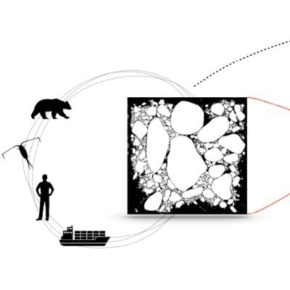An international collaborative project to better understand the impact of amplified warming in polar regions, through the development of a new sea ice modelling paradigm.
Through SASIP, the Scale-Aware Sea Ice Project, we propose to develop a truly innovative, scale-aware continuum sea ice model for climate research; one that faithfully represents sea ice dynamics and thermodynamics and that is physically sound, data-adaptive, highly parallelized and computationally efficient. SASIP will exploit large datasets from both granular process models and remote sensing to constrain sea ice properties and optimize continuum model parameters, jointly using data assimilation and machine learning methods. Coupling this multi-scale modeling framework to an ocean mixed-layer model, we will open up a new regime for polar oceanography via an examination of currently unresolved or poorly understood ice–ocean interactions across physical scales. In this systematic merger of models, observations, and numerical techniques, SASIP will reform sea ice modeling, a crucial leap needed to improve regional and larger-scale predictions of polar climate.
Through the further development of neXtSIM and the MEB rheological framework, SASIP will build a data-constrained model that is rigorously based on sea ice solid-like physics. This model will allow improved high resolution and large- scale predictions of Arctic and Antarctic sea ice, and the propagation of sea ice related climate feedbacks. Employing hybrid data assimilation and machine learning approaches as a native part of the model architecture will allow for objective combinations of model and data. Ultimately, SASIP will lead to reduced uncertainties related to the impact of amplified warming in polar regions on the global and interconnected environmental, climate, and economic systems.

73 months from 01/04/2021 to 01/05/2027
General aims
Earth system models (ESMs) require a new approach to sea ice modeling. In SASIP, we believe this new approach should be founded upon the existing neXtSIM model and its potential for better simulating coupled ocean–ice– atmosphere interactions. In addition we believe that current and possibly future observational data sets should be fully exploited. To attain this goal, SASIP will accomplish three main objectives:
- O1 Deliver an efficient, physically-based sea ice code for future ESMs
- O2 Develop sub-grid-scale sea ice model parameterizations that reflect multi-scale dynamical processes and their interaction with the ocean from the floe scale to the basin scale
- O3 Implement new data assimilation and machine learning strategies to exploit the massive volume of present and upcoming sea ice observations.
To accomplish these objectives, we have organized SASIP into six work packages (WPs). WP1-WP5 address the project’s science topic:
- WP1: Sea Ice Code Development – Optimization
- WP2: Sea Ice Rheology – Physical Parameterizations
- WP3: Ice-Ocean Interactions
- WP4: Data Assimilation – Machine Learning
- WP5: Climate Implications
Funded by
Schmidt Futures from 01/04/21 to 31/12/2023, Schmidt Sciences since 1/01/2024
CMCC role
CMCC participates in WP4 to develop an ensemble-based data assimilation scheme for the nextSIM-DG.
Activities
Interfacing neXtSIM-DG with a DA scheme.
Expected results
Having the capability to perform stand-alone sea-ice and coupled DA for state and parameter estimation.
Partners
- Centre National de le Recherche Scientifique (CNRS)
- Fondazione Centro-Mediterraneo sui Cambiamenti Climatici (CMCC)
- Brown University
- Centre Européen de Recherche et de Formation Avancée en Calcul Scientifique (CERFACS)
- Datlas, Grenoble, France
- Ecole Nationale des Ponts et Chaussées (ENPC)
- Mercator Ocean
- Stiftelsen Nansen Senter for Miljø Og Fjernmåling (NERSC)
- Otto-Von-Guericke-Universitaet Magdeburg (OVGU)
- The University of Reading
- Sorbonne Université
- Universita’ Di Bologna
Twitter/X: sasip-climate / @sasipclimate

